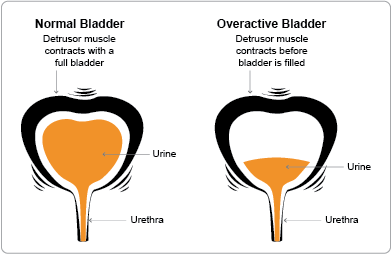
Overactive Bladder (OAB) isn't a disease. It's the name of a group of urinary symptoms. The most common symptom of GAG is a sudden urge to urinate that you can't control. Some people will leak urine when they feel this urge. Having to urinate many times during the day and night is another symptom of OAB.
OAB is common. It affects millions of Americans. As many as 30 percent of men and 40 percent of women in the United States live with OAB symptoms.
As you grow older, you're at higher risk for OAB. But no matter what your age, there are treatments that can help. Both men and women are at risk for OAB.
Women who have gone through menopause (change of life) have a higher than normal risk. Men who have had prostate problems also seem to have an increased risk for OAB. People with diseases that affect the brain or nervous system, such as stroke and multiple sclerosis (MS), are at high risk for OAB.
Food and drinks that can bother your bladder (like caffeine, alcohol and very spicy foods) may make OAB symptoms worse.
The major symptom of OAB is a sudden, strong urge to urinate that you can't control. This "gotta go" feeling makes you fear you will leak urine if you don't get to a bathroom right away. This urge may or may not cause your bladder to leak urine.
If you live with OAB, you may also:
OAB can happen when nerve signals between your bladder and brain tell your bladder to empty even when it isn't full. OAB can also happen when the muscles in your bladder are too active. Either way, your bladder muscles "contract" to pass urine before they should. These contractions cause the sudden, strong urge to urinate.
OAB symptoms may make it hard to get through your day without many trips to the bathroom. You may even cancel activities because you're afraid of being too far from a restroom.
OAB can get in the way of your work, social life, exercise and sleep. Your symptoms may make you feel embarrassed and afraid of being wet in public. You may be tired from waking at night or feel lonely from limiting social activities. If you are leaking urine it may cause skin problems or infections.
But you don't have to let OAB symptoms control your life. There are treatments to help. If you think you have OAB, please see your healthcare professional.
During your visit, your healthcare professional may:
Yes. There are treatments that can help you manage OAB. Your healthcare professional may use one treatment alone or several at the same time. Treatment choices include:
If these treatments don't help, your healthcare professional should send you to a specialist, such as a urologist who may specialize in incontinence, for other tests and treatments.
Talk with your healthcare professional. Sometimes OAB symptoms can be the result of a Urinary Tract Infection (UTI), an illness, damage to nerves, or a side effect of a medication. So it's important to go to a healthcare professional to find out if you have any of these problems.
If you do have OAB, there are treatments to help. Together, you and your healthcare professional can choose what's best for you.